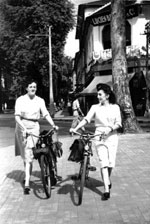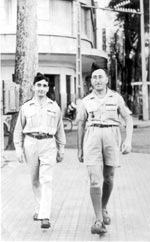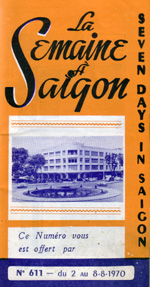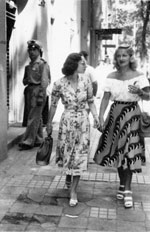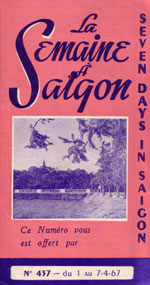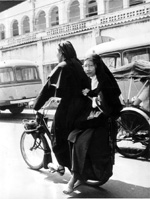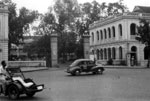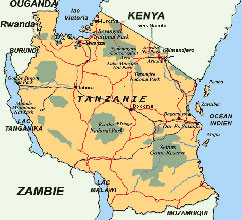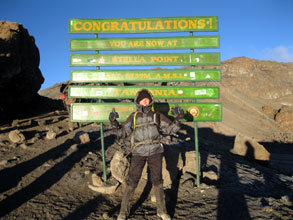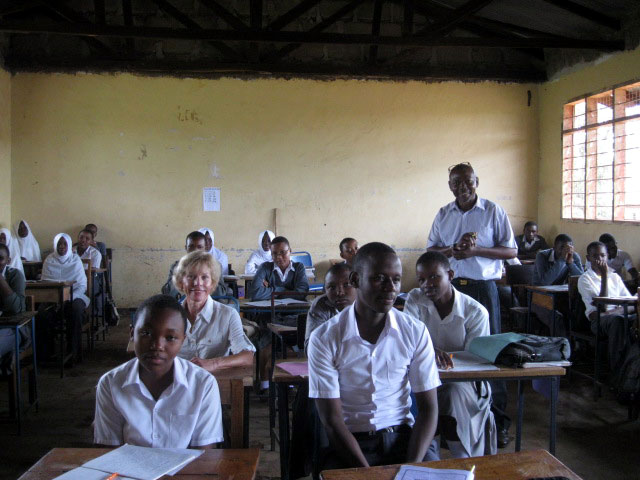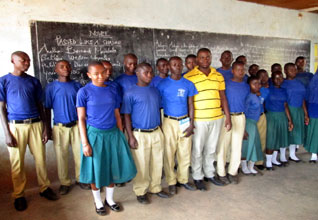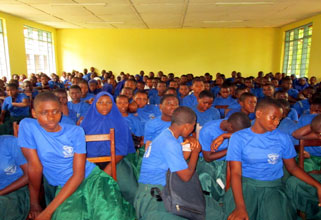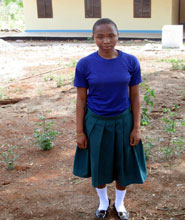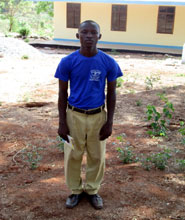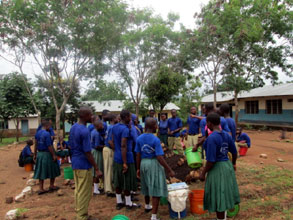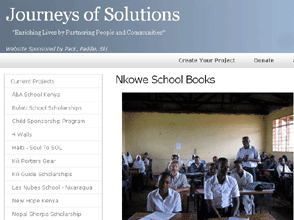

![]()
United Republic of Tanzania
Swahili: Jamhuri ya Muungano wa Tanzani
The name "Tanzania" derives from the names of the two states, Tanganyika and Zanzibar, that united on 26 April 1964 to form the United Republic of Tanganyika and Zanzibar.
On 29 October 1964, the country was renamed the United Republic of Tanzania

During the colonial period
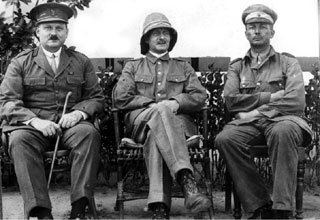
General von Lettow-Vorbeck in Dar es Salaam with a British Officer (left) and German Officer (right), March 1919
In the late 19th century, Imperial Germany conquered the regions that are now Tanzania (minus Zanzibar) and incorporated them into German East Africa.
The post–World War I accords and the League of Nations (Société des Nations in Genova) charter designated the area a British Mandate, except for the Kionga Triangle, a small area in the southeast that was incorporated into Portuguese East Africa (later Mozambique).
Nyerere became Minister of British-administered Tanganyika in 1960 and continued as Prime Minister when Tanganyika became independent in 1961.
In 1967, Nyerere's first presidency took a turn to the left after the Arusha Declaration, which codified a commitment to socialism in Pan-African fashion. After the declaration, banks and many large industries were nationalised.
From the late 1970s, Tanzania's economy took a turn for the worse.
Tanzania was also aligned with China.
(Source: From Wikipedia, the free encyclopedia)

Tanzania's founding leader Julius Nyerere
with US President Jimmy Carter in 1977
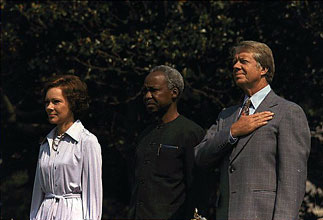
April 8 th, 1977, Rosalynn Carter, President Julius Nyerere of Tanzania and Jimmy Carter.


Nkowe Secondary School Project
Nkowe Secondary School is located in the poorest region of Tanzania.
Its students are anxiously awaiting their first ever shipment of textbooks thanks to the formation of a new charity in Western New York.
It is called the Nkowe Secondary School Project started by Marlene Killian this past October.

Marlene Killian is a private piano and voice teacher in Williamsville.
She has a B.M. Degree from SUNY at Fredonia, an M.M.E. Degree from Indiana University in Bloomington, Indiana and a French teaching certification from Buffalo State College.
She was a full-time vocal music teacher for many years and also worked in the field of Arts Management at Theater Place and with the Buffalo Philharmonic Orchestra.
Upon adopting two daughters from China she started a private business at her home.
In August, 2013, both girls started college. Ms. Killian was able to realize her dream of traveling to Africa.
She went on an adventure trip involving a climb up Mt. Kilimanjaro followed by a five day safari. She prepared for the climb for several months and thought that reaching the summit of the 19,370 foot (5,895 meters) mountain would be the greatest experience of her life.
Little did she know that her trip would evolve into a passionate mission to help the African people.
While in Africa Ms. Killian witnessed deplorable living conditions first-hand. Most Tanzanians live in shacks with no electricity, running water or paved roads.
They survive mainly on subsistence agriculture, working on tiny plots of land with primitive tools.
Nkowe Secondary School is in the rural Lindi Region in southeast Tanzania.
There are few teachers in the school and often 100 students are packed into a classroom.
Many students drop out of school because their families cannot afford the nominal annual fee charged by all government schools.
Learning takes place solely by copying notes from the chalkboard, all written in English. Most of the students have a very poor understanding of the English language and so they “blindly” try to memorize their notes.
They are unprepared for the national examinations and therefore most of the students don’t pass. Without a basic high school degree, jobs are impossible to find.
In order to find work to support a family, a high school diploma and a good command of the English language are necessary because the best paying jobs are in tourism.
Nkowe Secondary School Mr Malik and his students Nkowe Secondary School.
Being a teacher, Marlene Killian understands that education is the way out of poverty. Before leaving Tanzania, she promised to help at least one school and she chose the school that was the poorest.
Ms. Killian has been asked why she is so committed to Africa when there are so many needy children in Buffalo.
Her answer is that she is a religious person and believes that helping Africa has become a spiritual calling.
Ms. Killian is in regular contact with the headmaster of the Nkowe Secondary School and he has compiled a complete list of all the textbooks needed by his students.
Nkowe Secondary School Project is a branch of Journeys of Solutions, Inc., an existing umbrella charity with its office in Webster, New York.
Ms. Killian’s fledgling charity is now connected as well with the University at Buffalo’s Buffalo Tanzania Education Project. So far, most of the money has been raised from individual contributions.
The Chinese Club of WNY has backed the charity from the start and the Williamsville Rotary Club has invited her to speak at one of their meetings.

Journey of Solutions
If you care to contribute to this worthy cause, please make out a check to:
Journeys of Solutions Inc,
PO Box 28
Webster, NY 14580-0028
For further information contact:
Marlene Killian Project Manager
8253 Oakway Lane
Williamsville, NY 14221-2872
Ms. Killian invites you to support global literacy, one school at a time.


